The Vancouver Canucks made quite the splash in the offseason when they traded for JT Miller from the Tampa Bay Lightning and signed free agents Tyler Myers, Oscar Fantenberg, Jordie Benn and Micheal Ferland. All of the moves were met with varying degrees of scrutiny by media and fans alike.
Now that we are entering the second half of the season, I think it’s safe to say that general manager Jim Benning hit a home run with most of them as the Canucks are sitting pretty at the peak of the Pacific Division. Of all the offseasons he has overseen, this one has got to be the most impactful. So, let’s take a look at how each of the additions has changed the Canucks’ postseason chances for the better.
Related: Canucks’ Season Could Hinge on Next Road Trip
Miller Time on the Lotto Line
When Miller was acquired by Benning at the 2019 NHL Draft, Canucks fans were critical of the move. Firmly entrenched in a rebuild, they wondered why he gave up a crucial first-round pick in potentially the deepest draft in recent memory. Now that we have seen the fruit of the transaction, he may have got him at a bargain price.
All Miller has done since he joined the Canucks is put up points. In 49 games this season he has 48 points (19 goals, 29 assists), which eclipses his total from all of last season with the Lightning. He is also only 10 off his career-high of 58, set in the 2017-18 season when he was with the New York Rangers. In fact, he is on pace to shatter those numbers and get closer to 80 points by the end of the campaign. It’s not a stretch to say that he has quickly become a core player on this team.
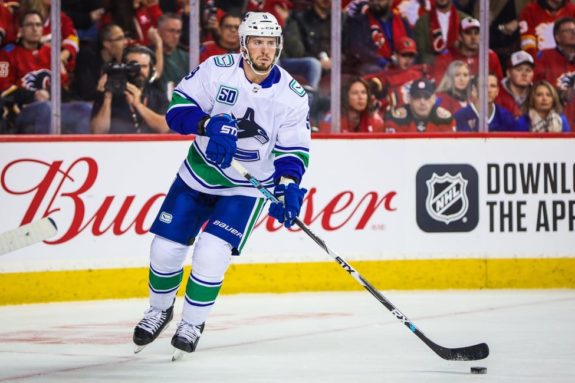
Miller has also gained the trust of head coach Travis Green, as he has become a go-to forward for the Canucks bench boss. He is averaging close to five minutes more ice time than last season and is counted upon to play in all situations and take key faceoffs in both the offensive and defensive zones. Additionally, he has taken on a leadership role, which recently garnered the praise of former linemate Steven Stamkos.
He’s been relied upon more to be a guy that goes out there and leads, whether that’s vocally or from his play…He works hard, he plays hard. I think he’s kind of pulling some of those younger guys along with him. You’re kind of seeing what he can do.
Miller is not only a key member of the top-six forward group but he is also part of one of the most lethal top lines in the NHL. Teaming up with fellow point producers Elias Pettersson (21 goals, 31 assists) and Brock Boeser (16 goals, 27 assists), they have formed the aptly named “Lotto Line”. Although they have not played together recently, they can still team up to create quite the three-headed beast. I think this trade could potentially go down as one of the best in Canucks’ history. That’s how good he has been.
Fantenberg Proving His Worth
There wasn’t much fanfare when Fantenberg was signed, in fact, he was more of an afterthought. Initially added to be the seventh defenceman and at most a stopgap for injuries, he has become so much more.
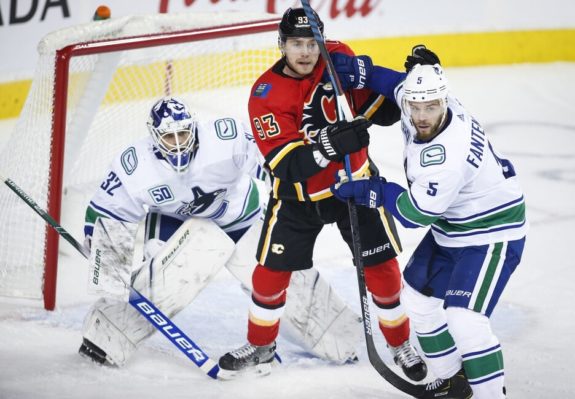
When Alex Edler went down with his annual injury, he got into the lineup after being a spectator for the first two months of the season. Since then he has only been a healthy scratch once. Instead, fellow free-agent signing Jordie Benn has been relegated to the press box, taking his spot as the seventh defenceman.
Averaging 15:54 of ice time per game, Fantenberg has been a steady presence on the blue line, showing off his mobility and physicality. He basically has been what Benn was supposed to be as a bottom pairing defenceman. Overall, he has turned into a very solid bargain signing for Benning and the Canucks.
Myers is a Core Piece on the Blue Line
When Myers was signed on the first day of free agency, there were mixed feelings amongst the faithful. Some felt he was not the right choice on the blueline despite his size and mobility. The term and money also got under the skin of many as well. Fast forward to today, and he has proven to be a good pickup for the Canucks. Like all defensemen, he has made mistakes and that has put him smack dab in the crosshairs of his doubters. However, you can’t deny the fact that he has become a core piece of the improved blueline that has the team in first place in the Pacific Division.
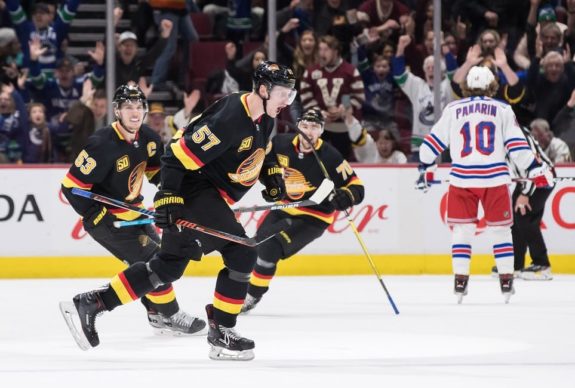
Myers isn’t putting up the number of points I anticipated when I put together my expectations for the new additions, but he has done other positive things away from the scoreboard. He plays in all situations, averages 21:36 of ice time (second only to Alex Edler), and is third on the team in blocked shots with 76. Overall, he has been a much better option than former Canucks’ defencemen Erik Gudbranson and Derrick Pouliot.
Benn and Ferland Slow Out of the Gate
Benn and Ferland have struggled to find a spot in the Canucks lineup, but not for the same reasons. Benn started the season as the de facto sixth defenceman behind Troy Stecher and played the first 37 games of the season with varying degrees of success. He then got removed from the lineup in favor of Fantenberg and has not seen much ice since. His last game was Jan 9 versus the Florida Panthers where he only played 12:44 and was a minus-1. Basically, he has been replaced by Fantenberg and subsequently banished to the press box.
However, he is still a serviceable defenceman capable of stepping into the lineup at any time. If and when injuries occur, and you know they will eventually, head coach Travis Green has a player that he is comfortable with playing 10-15 minutes a night. That is important when the playoffs roll around, as injuries start occurring more readily when the physicality inevitably ramps up.
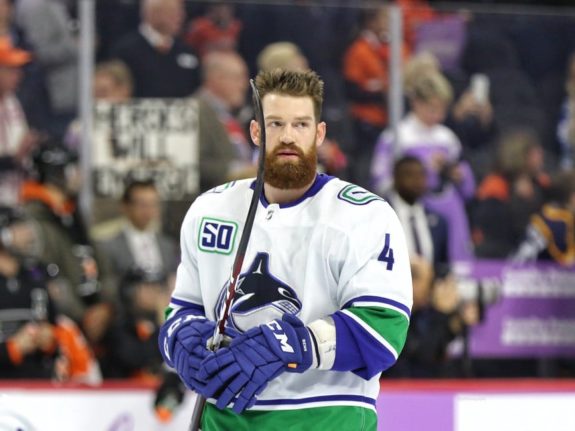
As for Ferland, his struggles out of the gate have nothing to do with performance or a player outplaying him. His season has been derailed by injuries, more specifically concussions. The first one occurred on Oct 30 against the Los Angeles Kings after a fight with Kyle Clifford. The second one appeared to be a result of a couple of innocent-looking hits against the Toronto Maple Leafs on Dec 10. Since then he has not returned to the lineup and remains on the injury reserve.
Before the first concussion, Ferland struggled to find a place in the lineup. Initially, it looked like everything was coming up roses for the rugged winger, as he was aligned with Pettersson and Boeser in the season opener against the Edmonton Oilers. But that experiment only lasted one game, and he has not seen time with those two since. After playing 17:36 in his debut, he has eclipsed the 12-minute mark only twice. Hopefully, when he eventually comes back he can find a spot in the lineup and contribute to the Canucks’ postseason push.
Changes Help Bring Playoffs Into Focus
For the first time in a long time, the Canucks are in a playoff position after the All-Star break. You can, of course, speak to the stellar goaltending from Jacob Markstrom and Thatcher Demko, the depth scoring, and the improved play of Jake Virtanen, Adam Gaudette, and Tanner Pearson. Not to mention the superstar performances from Pettersson, Boeser, Quinn Hughes, and Bo Horvat.
You cannot, however, forget about the positive impact the offseason additions have made on this team and the way Miller, Myers, and Fantenberg have kicked this team into high gear.
Related: Jacob Markstrom Emerging as Elite Goalie for the Vancouver Canucks
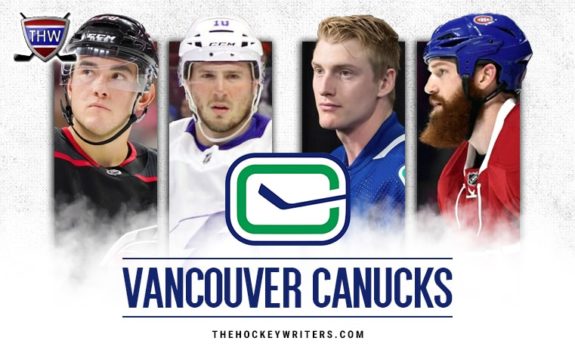
If Benn and Ferland can find a way to contribute too, then the Canucks will be playing playoff games at Rogers Arena once again. That’s an exciting prospect for a city that has not experienced it since Horvat first debuted in the NHL. I’m sure he’s chomping at the bit to lead his team to the green pastures of the postseason. Finally, after four seasons of futility, it may not be a pipe dream this time.